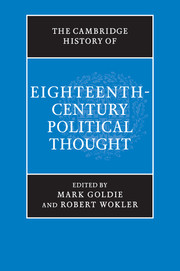Book contents
- Frontmatter
- Introduction
- Part I The ancien régime and its critics
- Part II The new light of reason
- 5 The comparative study of regimes and societies
- 6 Encyclopedias and the diffusion of knowledge
- 7 Optimism, progress, and philosophical history
- 8 Naturalism, anthropology, and culture
- Part III Natural jurisprudence and the science of legislation
- Part IV Commerce, luxury, and political economy
- Part V The promotion of public happiness
- Part VI The Enlightenment and revolution
- Biographies
- Bibliography
- Index
- References
7 - Optimism, progress, and philosophical history
from Part II - The new light of reason
Published online by Cambridge University Press: 28 March 2008
- Frontmatter
- Introduction
- Part I The ancien régime and its critics
- Part II The new light of reason
- 5 The comparative study of regimes and societies
- 6 Encyclopedias and the diffusion of knowledge
- 7 Optimism, progress, and philosophical history
- 8 Naturalism, anthropology, and culture
- Part III Natural jurisprudence and the science of legislation
- Part IV Commerce, luxury, and political economy
- Part V The promotion of public happiness
- Part VI The Enlightenment and revolution
- Biographies
- Bibliography
- Index
- References
Summary
Optimism
From the early seventeenth century a new age of rationalism sprang up, with Descartes as its main progenitor, and Spinoza and Leibniz as epigones. Since Descartes contributed so heavily to establishing confidence in reasoning as a reliable human instrument, it seemed useful to apply critical enquiry to the ancient mystery of evil and suffering. Did theodicy, that branch of philosophy concerned with the justification of God’s goodness and the refutation of arguments based on the existence of evil, still remain a valid approach? The traditional Christian explanations – the Fall and the redemption, original sin, eternal reward and punishments – no longer appeared to suffice as answers to the conundrums posed by the new philosophies.
The basic problem was not new. Epicurus had stated it centuries earlier: if evil exists then God must be either malevolent or impotent. No-one reformulated this dilemma with greater trenchancy than Pierre Bayle who, in his voluminous Oeuvres diverses (1727–31) and even more so in his Dictionnaire philosophique et critique (1697), was constantly engaged in forcing rationalist thinkers into a corner. Why, in a God-given universe, is mankind exposed to disease, hunger, and pain? Why do men have any inclination to evil? God must have foreseen, and therefore wished to prevent, human sin. It cannot be any justification to argue that God permitted sin simply to demonstrate his own powers. Such a God would be odious. Free will can scarcely be deemed a desirable gift if it can lead to everlasting damnation.
- Type
- Chapter
- Information
- The Cambridge History of Eighteenth-Century Political Thought , pp. 195 - 217Publisher: Cambridge University PressPrint publication year: 2006
References
- 4
- Cited by



